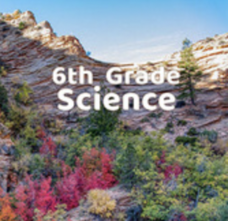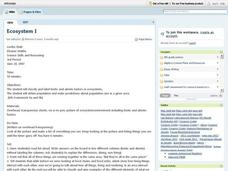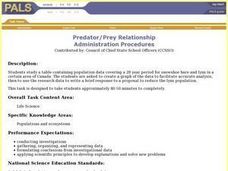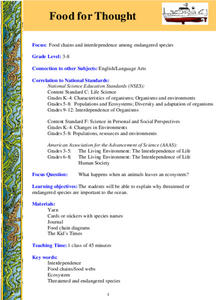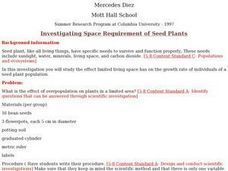College Board
2017 AP® Environmental Science Free-Response Questions
Almost half of test takers passed the AP Environmental Science exam in 2017. Use the free-response questions on the topics of pollution and ecosystems to improve writing skills in preparation for the AP exam. Discuss the scoring...
Utah Education Network (UEN)
Utah Open Textbook: 6th Grade Science
There are many interactions among living things and their surroundings. By completing a reading, scholars learn about the Earth, the moon, and the sun and how they relate to the solar system. They also investigate the basics of physical...
It's About Time
Diversity in Living Things
How diverse is the world we live in compared to the way things used to be? Young biologists explore diverse organisms and relate the structure of each organism to its ability to survive in our current environmental conditions....
PBS
Bird is the Word
Tracking area birds can tell a lot about an ecosystem. Learners use that understanding as motivation to observe and record bird populations in their area. They use journaling to store their information and ultimately choose one bird as...
National Wildlife Federation
Gator Hole Graphics
Climate changes are cyclic so how do these changes impact species that live in different habitats? Learners examine the rainfall levels in a specific swamp habitat. They also review graphical data and tell a story about how the...
Nature Works Everywhere
Sharks and Shorelines
Examine predator-prey marine relationships through an interactive lesson design. Learners begin by studying a specific shark species and then analyze real-time shark-tracking data. They also study threats to shark populations and...
College Board
2011 AP® Environmental Science Free-Response Questions
Beetle population, climate change, and acidification are all real environmental threats. Scholars display their knowledge of these threats and offer solution strategies in a four-question assessment resource. Questions from the AP® exam...
Curated OER
Biomanipulation
Learners explore the effects of aquatic trophic relationships on water transparency. They observe and explain the effects of reducing nutrient inputs on agal density on water transparency.
Curated OER
Beetle Collection and Release
Young scholars investigate plants and compare them to the purple loose strife. As they observe the plants they predict possible impacts on plant populations based on their observations. They work in groups and present their findings to...
Curated OER
Organisms and Their Environment
Learners explore Earth's biosphere. In this biosphere instructional activity, students participate in group activities regarding biotic and abiotic factors, population density, and species' habitats.
Virginia Department of Education
Freshwater Food Chains
What's in the water? Encourage your class to further explore this question and learn about pond ecosystems, food chains, and food webs as they complete this hands-on activity. They view the environment from a new perspective...
Curated OER
Oh, What a Tangled Web We Weave
Fifth graders investigate the food chain by viewing video clips. In this food web lesson, 5th graders investigate populations and ecosystems by viewing a video in class as well as visiting web sites. Students utilize the Internet to...
Curated OER
Ecosystem I
Learners classify and label biotic and a-biotic factors in ecosystems. They define population and make predictions about population size in a given area. They describe the a-biotic factors' importance and impact on the other elements...
Curated OER
Spring of Life
Students explore Florida's springs using video segments. In this video instructional activity, students examine Florida's springs ecosystem, the animals that live there and the red tide that threatens the environment. The instructional...
Curated OER
Predator/Prey Relationship
Young scholars study and analyze data collected on the relationship between the snowshoe hare and lynx in Canada over a 28 year period and create a graph. Students also write a response to a proposal to reduce the lynx population.
Curated OER
The Captain And Lake Wilmar
Tenth graders examine the ecosystem of Lake Wilmar through three coordinated performance tasks. They first investigate the effects of pH on freshwater animals by comparing the zooplankton counts from three different areas. They then...
Curated OER
Web of Life
Students collect information about various organisms in a forest ecosystem and create a mural that depicts organism interdependence. They then simulate a food web using a ball of string.
Curated OER
Organisms and Their Environment
In this organisms and their environment worksheet, learners will review concepts relating to ecological studies, levels of organization in ecology, and relationships between organisms in ecosystems. This worksheet has 10 fill in the...
Curated OER
Deer Population
Ninth graders study deer including their reproduction rate and management in Pennsylvania. In this deer overpopulation lesson students estimate deer population and suggest management tools.
Curated OER
Food for Thought
Young scholars explore the food chains in a variety of ecosystems and its relationship to the survival of threatened or endangered marine animals or fish in the ocean. The interdependence of the species is investigated in this lesson.
Curated OER
The Living Environment
Students explore the cycles of an ecosystem. For this environmental science lesson, students work in groups to research the nitrogen cycle, the water cycle, or the oxygen-carbon dioxide cycle. Students prepare a PowerPoint or other...
Curated OER
The Mechanisms of Decay and Decomposition
Eighth graders study how all living things die. They are introduced tot he life cycle and the concept of an ecosystem. Students have a introductory exposure to trophic levels (producer-consumer-decomposer) in the environment.
Curated OER
Norman Suburban Activity
Students analyze the factors affecting organisms in the pond ecosystem. In this environmental science activity, students perform an experiment to determine pH, nutrients and temperature of different pond sites. They present their result...
Curated OER
Investigating Space Requirement of Seed Plants
Students use scientific methods to investigate the effects of overpopulation of seed plants on growth in a limited living space. Students relate seed plant population findings to that of other organisms.



